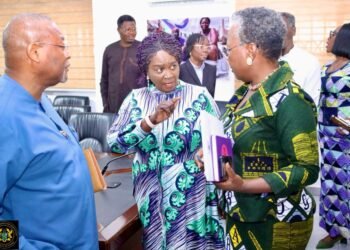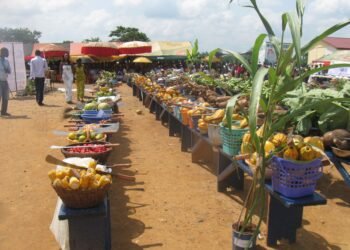The Minister for Finance, Ken Ofori-Atta has revealed that government has invested GH¢1.85 billion in the agriculture sector since its inception of office which is calculated as 5.2 per cent.
He made this revelation during the Mid-year 2020 budget review which was held at Parliament on Thursday, 23rd July, 2020. According to him, the incumbent government’s intervention salvaged the sector from an average of two per cent between 2014 and 2016 to an average of 5.2 per cent over the past 3 years.
This he says, is as a result of some initiatives like Planting for Food and Jobs (PFJ) and One District, One Factory (1D1F) it put in place to boost local production of food and create jobs.
A total number of 1.5 million farmers have been mobilised and registered under the PFJ programme which is an increase from the initial enrolment figure of 202,000 farmers in the year of inception, 2017, Finance Minister continues to disclose.
While addressing Parliament, Ken Ofori-Atta highlighted the Planting for Food and Jobs initiative as one of the major achievements under the Akufo-Addo-led-administration.
He indicated that to ensure the availability of food following the pandemic, additional farmers were brought on board.
“To enhance food production in the wake of COVID-19 and enable more farmers access inputs, an additional 300,000 farmers were registered onto the programme, increasing the number of beneficiaries from the initial target of 1.2 million to the current 1.5 million.”
The Finance Minister detailed the inputs made by government to contribute to the success of the programme.
“Mr. Speaker, as a result of the usage of improved seeds and fertilizer by farmers, productivity of selected food crops has increased. National maize production increased by 71 per cent, from 1.7 million MT in 2016 to 2.9 million MT in 2019, while paddy rice increased by 34 per cent from 688,000 MT in 2016 to 925,000 MT in 2019.nIn the first half of this year, a total of 219,193 MT of organic andinorganic fertilizers were distributed to farmers against a revised target of 412,000 MT for the year. In addition, a total of 6,023 MT of seeds were distributed to farmers across the country.”
According to him, the overwhelming success and attractiveness of the programme led to the evolvement of five other modules under the scope. These are: Food Crop Development; Planting for Export and Rural Development (PERD); Mechanisation; Rearing for Food and Jobs (RFJ); and Greenhouse Capacity Development modules.

Mr. Ofori-Atta gave details about the new modules starting with the Planting for Export and Rural Development (PERD).
“PERD module was launched in 2019 to promote the development of selected tree crops for diversified export earnings, increased farmer incomes, development of agro-industries, and empowerment of rural economies. A total of 15 million seedlings of cashew, coffee, coconut, and oil palm were distributed to farmers. Parliament also passed the Tree Crop Development Bill, fashioned along the lines of COCOBOD, into law.”
He went on to the Rearing for Food and Jobs which he indicated was implemented to build a competitive livestock industry and reduce the over reliance on imported meat.
“Under the module, a total of 30,000 cockerels were distributed to 3,000 farmers in 12 selected regions in 2019 for crossing with local hens to improve the live weight from 1.2kg to 1.5kg, and egg laying rate from 70 to 110 eggs per year. A total of 7,500 small ruminants were also distributed to 750 farmers in six selected regions.”
While talking about Greenhouse Capacity Development in the Mid-year 2020 budget review, he established that, three greenhouse training centres with commercial components have been constructed at Dawhenya, Akumadan, and Bawjiase, each on a five-hectare piece of land. He then gave a breakdown of the number of people trained and yet to be trained under this module.
“At the end of December 2019, the three centres had, together, trained 296 graduates in greenhouse vegetable production. Additionally, a total of 180 graduates were targeted for training in 2020, of which 61 had been trained as of end-June 2020. The remaining 119 graduates are scheduled to receive their training during the second half of the year.”
Giving a brief on mechanization, he listed a few achievements under this module however, he stated that government in the second half of the year
“will conclude arrangements for the importation of about US$31 million worth of farm machinery and equipment, including hand-held equipment, tractors, combine harvesters, and rice mills, under the 3rd tranche of the Brazil ‘More Food International Programme’.”
Read also:106 districts yet to benefit from 1D1F























